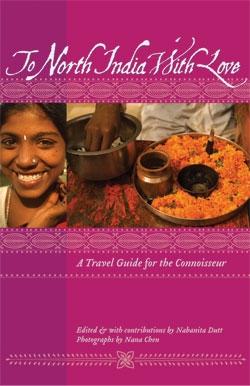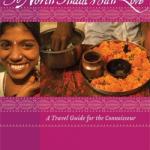Emma Louise Christie Debates the Merits of a Tibetan Ritual in Dharamshala
Excerpted from To North India With Love, available from ThingsAsian Press.
I was out on an Indian adventure with two trusted guides: a Tibetan friend and the moonlight. As I stumbled down the pebbled road, I held on to the former's hand, not sure why we were making our way to the Dalai Lama's temple in the dead of night. When I had asked, my friend only smiled mysteriously and said that it was a surprise.
The temple loomed ahead of us, a charcoal silhouette against the dark sky. I had spent plenty of time there, spinning the prayer wheels and listening to the Dalai Lama speak, but the way we were creeping up to it while the rest of the town of Dharamshala slept made me feel slightly uncomfortable.
I detected a murmur in the air, which intensified into clearly audible shouts and derisive laughter as we climbed the stairs up to the main hall. I looked questioningly at my young friend, but he only motioned with his head for me to continue. When loud slapping sounds floated down to us, I started to regret the impulse to accompany him here. I hadn't encountered any religious activity that could produce such noises in this temple before, and the darkness of the night made them seem all the more ominous. My imagination conjured crazy possibilities of what was going on inside, but I willed myself to move toward the source of the commotion.
As we stepped into the main hall, I saw scores of Buddhist monks milling about. Some were huddled on the ground while the others walked agitatedly around them. A ritual was clearly in progress-maybe this was a meeting of a secret brotherhood of monks-and I felt like an interloper. I was the only one not wearing burgundy robes, and whose head didn't shine in the moonlight. I was a white foreign woman on top of that, and I had walked into this midnight scene quite uninvited. My companion attempted to reassure me by explaining what was going on. This was a traditional debate, he said, an integral part of the Tibetan monastic education. Really, none of the monks cared that I was there.
I watched as monks bore down aggressively on fellow monks on the ground, raising their arms behind them and then slapping the air over and over again, jeering all the while. Those on the ground were trying to defend themselves with counterarguments. While I couldn't understand what they were saying, as they spoke in Tibetan, I could see that the points the lowered monks were making had no impact on their tormentors, who continued to stamp their feet and slap the air, shouting all the time. This could have seemed comical in a different set of circumstances, but at that time I was more concerned than amused.
My Tibetan friend tried again to help me understand. After much gesticulating and shouting back and forth in order to be heard over the arguing monks, I finally understood that nobody was being abused here. Because the questions raised in the debates used to train novice monks were so complex at times, it was difficult to thrash them out with much enthusiasm, so the process was livened up. This also gave the trainee monks a lesson in the art of quick thinking. Apparently, Tibetan scholars loved the energetic physical gestures for the excitement they created and missed debating in this manner once their training period was over. What I was witnessing was nothing more than a common Tibetan Buddhist debate practice. The crazy madmanlike gestures of the questioners were just part of a routine.
We wandered from group to group, listening to the exchanges. The monks were so involved in their heated discussions they scarcely noticed us. They wrung the strings of prayer beads in their hands and just went on screaming at each other. One monk, I noticed, was getting a little physical with his opponent while he made his assertions. Every time he walked up to the monk sitting on the ground, he rapped him lightly on the side of the face. It was annoying to watch, and I wondered why the recipient of these blows was not protesting. As we got closer to the pair, however, I saw that the aggressor laughed each time he did it, and his opponent shook his head ruefully. Obviously, the monk on the ground was making a poor show of it and didn't mind being chastised in this way for his lack of good arguments.
Later, I learnt that these debates could disintegrate into open fights. The questioner sometimes became vicious, rubbing in his victory by shouting, "The root thesis is finished! The root thesis is finished!"-the stock phrase winners use to close a debate. In the face of intense public humiliation, some respondents suffered from bouts of depression. On rare occasions, a debate even led to blows and lifetime enmity. On the whole, however, the trainee monks approached the exercise in a positive spirit, and as the session I attended came to an end, the monks closed their debates by congratulating each other, looking happily exhausted and satisfied.
As my friend and I returned from the night's adventure, my mind kept replaying scenes from the debates. Tibetan monks, in my experience thus far, were peaceful people, and I was still having trouble reconciling that image with the aggressive scene I had just witnessed. While it was somewhat disconcerting to watch, I have to admit that it was also intriguing once I knew the background. And in the end, my exposure to the debates rounded out my experience with the Tibetan monks in Dharamshala, showing me that these seemingly perfect people are human, after all.
FACT FILE:
Getting to Dharamshala/McLeodganj
Only a few flights land every week at the nearby Gaggal Airport from Delhi. You can also rent a taxi from Delhi, Chandigarh, or Shimla and drive down to Dharamshala. The nearest railhead is in Pathankot, which is connected to major cities in North India by regular train services.
Monastic debates
The Tibetan name for this one-on-one debate is rtsod zla. In Dharamshala, the monks do not mind if visitors watch or even film a rtsod zla in progress. Almost every monastery with trainee monks holds these sessions, and you can ask about times once you arrive in town.
 ThingsAsian
ThingsAsian

















